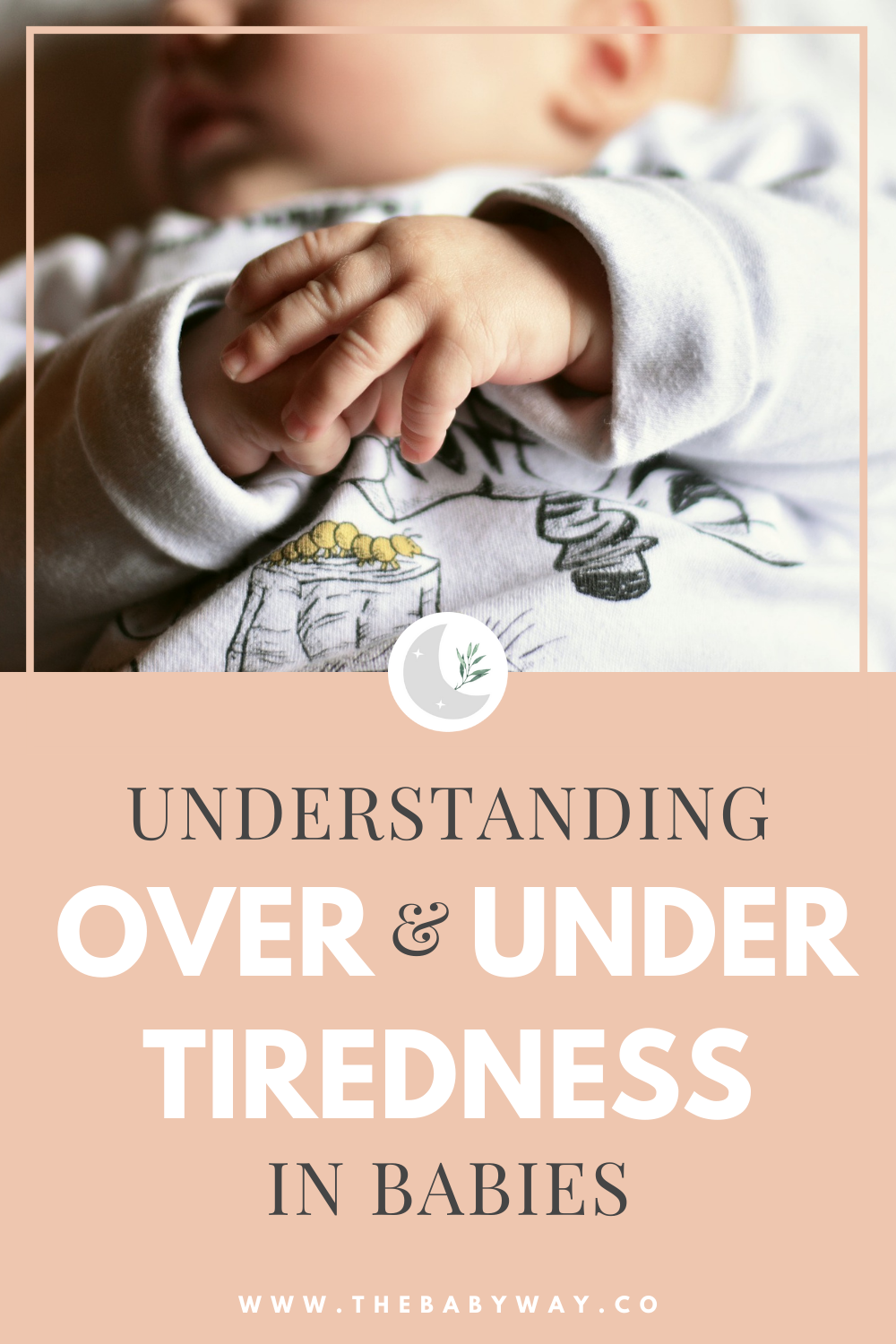Signs your baby is under- or overtired and what you can do about it
Ok, she is yawning. Perfect. Maybe I will wait a little longer, get her extra tired, and then maybe she will sleep better at night.
HA HA HA laughed my baby in my face.
Ok, she didn't really laugh.
Unfortunately, she cried, and I did, too.
And she didn't sleep. Neither did I.
She slept worse.
And got up early in the morning.
So did I...
Like what the heck?!
Have you ever attempted to let your children stay up longer so they would fall asleep faster or sleep longer in the morning? Did it work for you?
If I can tell you one thing about baby sleep, then it would be this:
Baby sleep does not work like adult sleep.
I mean, you and I, we understand each other, right? We could probably doze off right here and right now. Well, not so our children.
I know it sounds weird and illogical, but babies and toddlers work in mysterious ways, don't they?
Well, here is the thing. Finding the right time to put your baby to bed can be very helpful. It will help them fall asleep much easier and sleep better during naps and at night.
So before I tell you how to find the right time to put your baby to bed, let's first understand what is going on and why overtired babies sleep worse.
What is an overtired baby?
When we talk about an overtired baby, we are talking about a baby that is just too tired. As simple as that. But the interesting question is rather how does overtiredness develop?
What's happening inside is that a baby's body and mind physically cannot handle being up anymore.
Whenever your baby is awake and exposed to different kinds of stimulation, the stress hormone cortisol is released. During a wake window, the cortisol levels will slowly rise. A nap helps to bring those cortisol levels down again.
Now, if your baby stays awake for too long and the cortisol levels continue to rise, at some point, they will be so high that your baby cannot regulate anymore. Your baby is now overtired.
They will become fussy and unsettled. They might cry and be really hard to soothe. Toddlers can have one tantrum after another. And they don't do it on purpose. They really cannot control it.
Once the cortisol levels hit a peak, it's hard to bring them down. All those stress hormones in their body will make it difficult for them to fall asleep and stay asleep even when they are so tired.
Sometimes babies get more easily overtired during a sleep regression or when they are about to drop a nap. In that case, you can move bedtime forward until they get used to longer wake windows.
There is also this fear of parents that their baby will develop sleep debt if they are overtired too often. This only happens in rare cases. Sleeping is an ability that comes naturally, and in the end, your baby will get the sleep they need. Even if your baby has been overtired a few days in a row, they will catch up on lost sleep eventually.
If you have a constantly crying or fussy baby, something else might be going on.
How does overtiredness affect sleep?
If cortisol levels are too high, your baby will have trouble sleeping. The more stress hormones are released into their body, the more difficult it will be for your baby to fall and stay asleep.
Overtiredness will affect sleep in different ways. At nap time, your baby might only sleep for a short amount of time waking after their first sleep cycle (20-40 minutes). In the evening, they can have increasingly disrupted nighttime sleep. They might wake shortly after falling asleep or wake more frequently during the night.
Typical behavioral sleep signs that point to overtiredness are:
- short naps(mostly about 20 - 40 minutes)
- cannot be resettled after waking up from a nap
- more wakings at night
- wakes shortly after going to bed in the evening
- early wakings in the morning
Signs your baby is overtired
Some typical signs of an overtired baby will seem like typical tired signs, so it is not always so easy to differentiate them. Or the opposite is happening. Your baby suddenly appears to be wide awake and hyperactive.
Signs your baby is overtired:
- yawning several times
- rubbing eyes or face
- becoming clingy
- moving away from other people or stimulation
- lack of focus
- fussiness/ tantrums/ crying & difficult to calm down
- becoming hyperactive
What is an undertired baby?
Just like babies can be too tired, they might not be tired enough as well. And in an attempt to prevent that dreaded overtiredness, we often put our little ones to bed too early. Or because we just simply want them to go to sleep finally.
And the result is a baby that cannot fall asleep and gets frustrated, a toddler that doesn't stop talking in bed, and a parent that gets frustrated.
How does undertiredness affect sleep?
A baby that is not tired enough will be extremely difficult to settle. And even more so, they will show very troubled sleeping behavior like:
- catnapping (mostly about 20 - 35 minutes)
- cannot be resettled after waking up
- more wakings at night
- wakes at night and does not want to go back to sleep/ starts to play
- early wakings in the morning
Signs your baby is undertired
You cannot force a baby to sleep if they are not tired, even if it is already bedtime on your watch. Because your child will not always nap or go to bed at the same time every day. It depends on what they did and how long it has been since their last nap. Sometimes you would also think they are tired, but in truth, they are just bored.
So if you find yourself trying to settle your baby for more than 20 minutes and experience any of the cues below, it is better to lengthen their awake time and/or delay their bedtime.
- resisting nap/ bedtime (first happy then crying, becomes very fussy)
- seems frustrated or emotional but stops when picked up
- playing in crib/ standing up frequently
- takes a lot of time to settle, even with help
- only falls asleep with intense help (rocking, feeding)
- short nap
- early morning wake
When is the right time to put my baby to bed?
So I guess what we want is simply a tired baby. But when exactly is that?
Finding the right time for sleep is more crucial with a newborn baby than a toddler. Also, your baby does not go from being undertired to directly being overtired. There is a fair amount of time in which they are simply tired.
You can best figure that out by watching out for sleepy cues.
Typical signs of tiredness are:
- pulling at ears
- yawning
- red eyebrows/ redness around the eyes
- turning head away
- losing interest in play
- losing patience
- blank stares
- becomes more attached or irritated
There are other things you can do additionally to learn when it is a good time to sleep.
A flexible sleep schedule according to your baby's age will make the right nap time more predictable. It doesn't have to be a fix schedule. But when you know your baby's approximate sleeping hours, it will make things easier.
Another thing that I always recommend is to start with your bedtime routine not too late. Sometimes, as a parent, you are totally caught up in everything that quickly needs to get done, such as cleaning up dinner that we have only little time left for our routine. It can be really stressful to do a bedtime routine with an overtired child. And a bedtime routine should actually be calming. So it's better to plan enough time for your routine, and if your child is not tired yet, you can still engage in some quiet and relaxing activities.
How long are under- and overtiredness a thing?
Newborn babies or young babies up to 6 months will sleep worse and have a hard time falling asleep. Catnapping is very typical during this age. So here you want to watch more carefully for overtiredness.
An older baby (6-12 months) will still be affected by overtiredness. They will find it hard to settle to sleep or wake more frequently at night but usually catch up on sleep during naps. So not much catnapping is happening here anymore. Between the age of 1-2, they might still experience some disruptions during the night due to overtiredness.
Toddler sleep is almost not affected by overtiredness anymore. Instead, they will mostly get grumpy, frustrated, and hard to please or console. Bedtime battles or nap resistance are typical, too.
So it affects more their behavior before going to bed. They will usually still fall asleep fast and sleep at night. But they will most likely still wake in the morning. Children are naturally early birds. Maybe they will sleep 30 minutes longer, but they don't usually sleep in for an additional hour or more (you know FOMO in toddlers is a real thing). This usually lasts until the age of 3-4. Children closer to 4 years can most of the time verbally express that they are tired and want to go to sleep. YAY!
Finding the right time to put your baby to bed can feel like a challenge at first. But as you get to know your little one better and better and they naturally develop a sleep routine, you will learn to read your baby's sleep cues. My little boy, for example, would always lay down his head somewhere. It was the cutest thing.
And even if your baby is overtired, you don't need to freak out. It will probably happen more than once. Just get them to bed as soon as possible. And while I know that it can be really stressful and frustrating to hear a child cry inconsolably, you need to stay calm and be the source of calm for your child. Offer a lot of contact and support.
From personal experience, I can tell you the least effective thing is to be anxious or force them to fall asleep independently. Yes, healthy sleep habits that promote independent sleep are important. But when your baby is overtired, you will fight a fight that is, in my opinion, not worth it. It is just not the right timing for that. You will not create a bad sleep association by helping an overtired baby fall asleep. When your baby is content, they will be much more acceptive of new ways to fall asleep than when they are in tears they cannot control.









